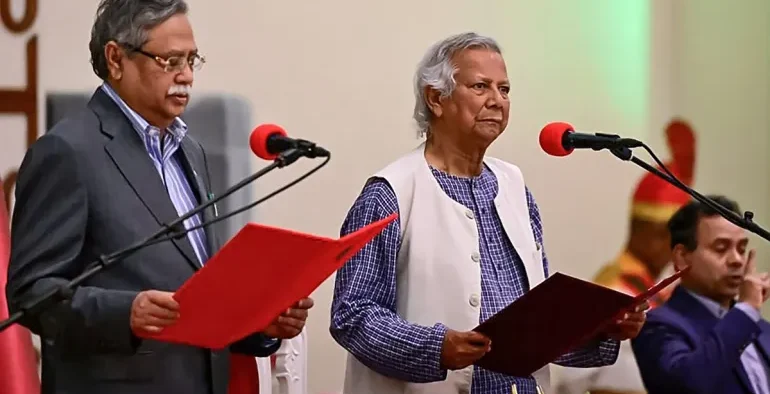Yunus sworn in as interim Bangladesh leader

The 84-year-old took an oath at the presidential palace in Dhaka along with more than a dozen members of his new cabinet, vowing to perform his duties “sincerely”.
He flew into the capital, Dhaka, just days after Sheikh Hasina – the woman who ruled Bangladesh with an iron fist for 15 years – fled across the border to India.
Ms Hasina resigned as prime minister after weeks of student-led protests – which left hundreds dead – escalated and culminated in calls for her to stand down.
The decision to name Prof Yunus as chief adviser of the interim government followed a meeting between President Mohammed Shahabuddin, military leaders and student leaders.
The students had been clear they would not accept a military-led government, but wanted Prof Yunus to lead.
Among his new cabinet are Nahid Islam and Asif Mahmud, students who led the anti-government protests.
The hope is Prof Yunus, the so-called banker for the poor, will bring democracy back to Bangladesh after years of autocratic rule.
“People are excited,” the entrepreneur and economist told the BBC moments after arriving in Dhaka from France on Thursday.
He later told reporters that Bangladesh “has got a second independence” as he called for the restoration of law and order in the nation of 170 million people.
Following Prof Yunus’s swearing in, Indian Prime Minister Narendra Modi offered his “best wishes”, writing on X/Twitter that his government was “committed” to working with its neighbour for “peace, security and development”.
Prof Yunus paid tribute to those who died, saying they had “protected the nation” and given it “new life” after Ms Hasina’s rule.
She had begun that rule as a symbol of democracy but, by the time she fled, she was considered an autocrat who had sought to entrench her authority by silencing dissent.
Prisons were filled with people who sought to speak out against her. Prof Yunus – lauded for his pioneering use of micro-loans – was one of those who found themselves in legal trouble during her tenure.
Ms Hasina regarded him as a public enemy – he is currently on bail, appealing against a six-month jail term in what he has called a politically-motivated case.
Speaking on Thursday, he called on the country’s young people to help him rebuild the South Asian country.
“Bangladesh can be a beautiful country, but we destroyed the possibilities,” he said.
“Now we have to build a seedbed again – the new seedbed will be built by them,” he added, gesticulating towards the students who had arrived to greet him.
BBC










